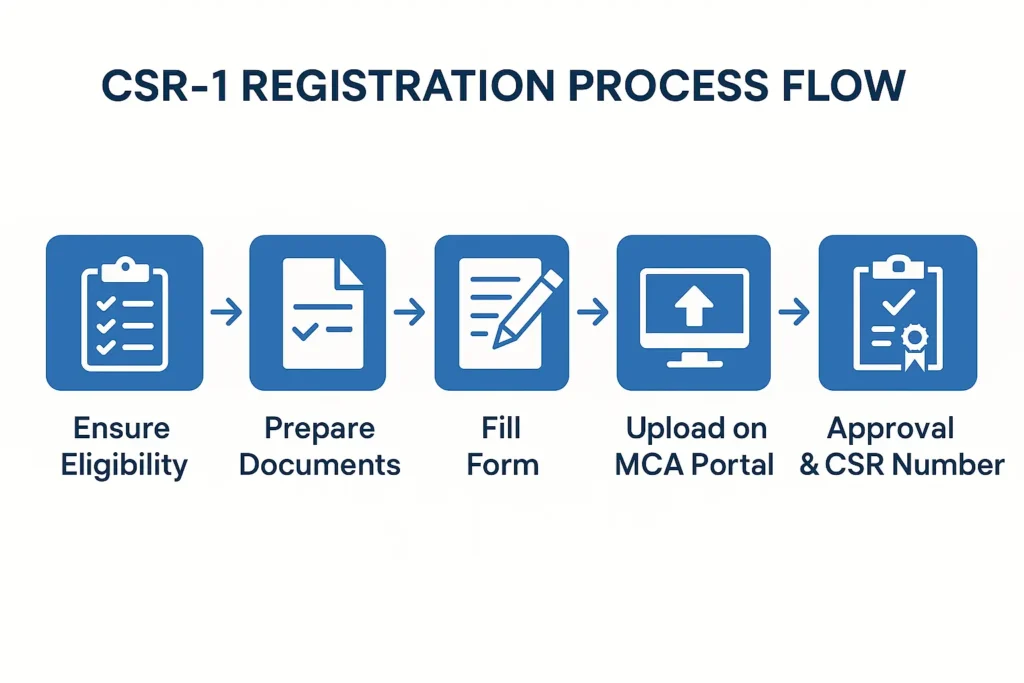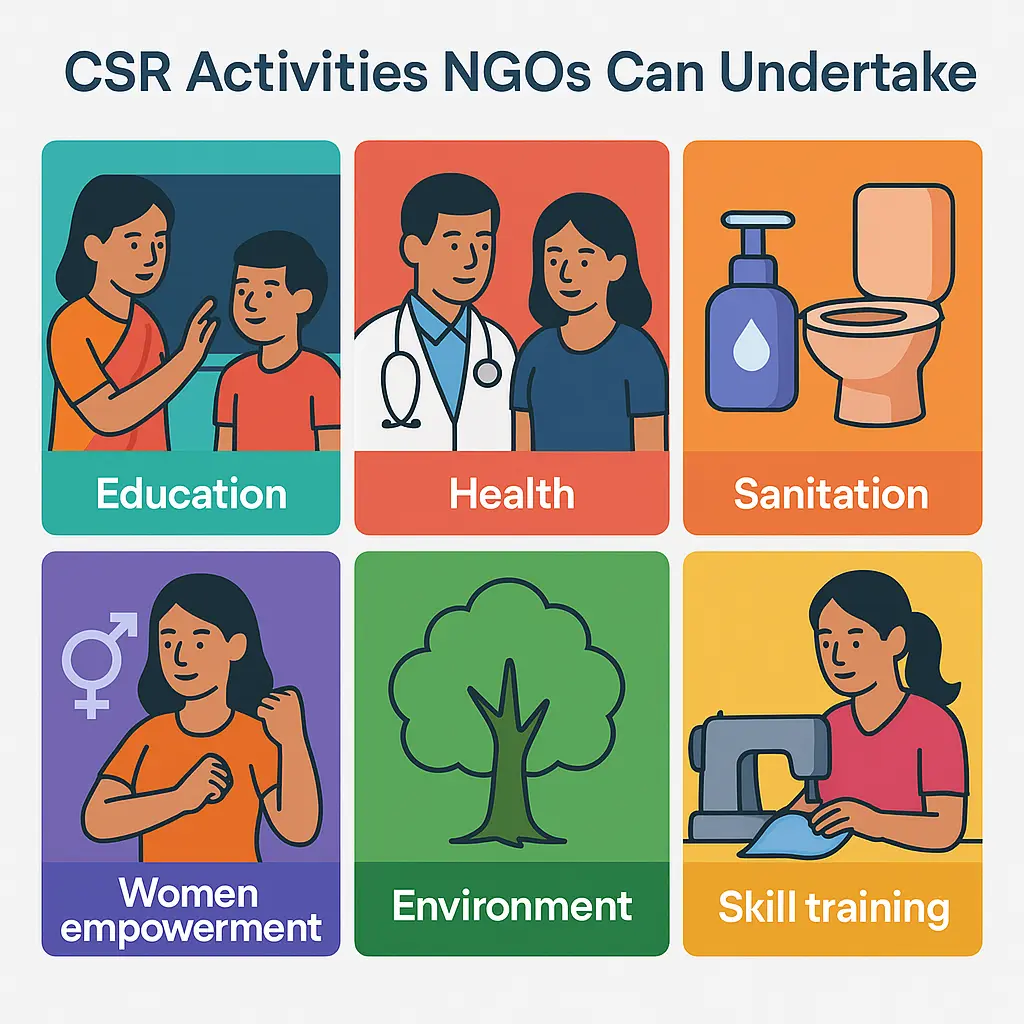How to Apply for CSR Registration Online and Receive Corporate Funding
In India, CSR registration for NGOs is crucial for non-governmental organizations, trusts, and societies seeking donations under Corporate Social Responsibility (CSR) initiatives. Introduced by the Ministry of Corporate Affairs (MCA), Form CSR-1 serves as the official application for NGOs to be eligible to receive CSR funds from companies under Section 135 of the Companies Act 2013.
This article explains everything you need about CSR-1 registration, including eligibility, the process, documents required, and frequently asked questions. Whether starting a new NGO or running a registered nonprofit, understanding NGO CSR registration is essential for accessing corporate funding.
What is CSR-1 Registration?
CSR-1 registration refers to the mandatory filing of Form CSR-1 with the MCA. It is a declaration by a nonprofit organization that it wishes to be eligible to receive CSR funds from companies.
Once the form is successfully filed and approved, the organization is issued a unique CSR Registration Number. Only those NGOs that have completed CSR registration in India can receive CSR funds from corporates.
Why is CSR-1 Registration Important?
According to the Companies Act, any company with:
- Net worth of ₹500 crore or more, or
- Turnover of ₹1,000 crore or more, or
- Net profit of ₹ five crore or more
…must spend 2% of their average net profit of the last 3 years on CSR activities.
However, these companies can only fund CSR-registered NGOs. Therefore, without NGO CSR registration, your organization becomes ineligible for receiving such contributions.

Who Can File CSR-1 Form?
To be eligible for CSR-1 registration, your organization must fall into one of the following categories:
- Section 8 Company (under Companies Act, 2013)
- Registered Public Trust (under the Indian Trusts Act)
- Registered Society (under the Societies Registration Act)
Additionally, these entities must:
- Be registered under 12A and 80G of the Income Tax Act
- Have at least 3 years of track record in conducting charitable activities (for implementing agencies)
Benefits of CSR Registration for NGOs
- Access to corporate funding from CSR-compliant companies
- Visibility on the National CSR Portal
- Improved credibility among donors and stakeholders
- Enables participation in high-value CSR tenders and collaborations
- Transparent and accountable fund utilization framework
Step-by-Step: CSR-1 Registration Process in India
Here’s a simplified breakdown of how to complete CSR registration in India for your NGO:
🔹 Step 1: Ensure Your NGO is Eligible
Before proceeding with CSR-1 registration, verify that your NGO:
- Is a Trust, Society, or Section 8 Company
- Has a valid PAN card
- Possesses 12A & 80G registration
- Has an active bank account in the name of the organization
- Has a valid Digital Signature Certificate (DSC) of the authorized signatory

🔹 Step 2: Prepare the Required Documents
You will need the following:
- PAN card of the organization
- Registration certificate (Trust deed/Society Registration/Section 8 incorporation)
- 12A and 80G certificates
- DSC of the authorized representative
- Details of governing body members
- Email and mobile number of the contact person
- MCA registered ID (if Section 8)
🔹 Step 3: Download Form CSR-1 from the MCA Portal
Visit the Ministry of Corporate Affairs website and:
- Navigate to Forms and Downloads
- Download Form CSR-1 (in .eForm format)
- Open the form using MCA utilities
🔹 Step 4: Fill in the Details
Complete all relevant fields in the form:
- Type of organization
- Registration number and date
- PAN details
- Address and contact info
- Details of implementing agency (if any)
Attached is the DSC of the Authorized Signatory and Practicing Professional (CA/CS/CMA).
🔹 Step 5: Upload Form on MCA Portal
After verification and DSC authentication:
- Upload the completed form on the MCA portal
- A Service Request Number (SRN) will be generated
- Track the status online
Upon approval, the MCA will issue a CSR Registration Number, and the NGO’s name will appear on the National CSR Portal.
What Happens After CSR-1 Approval?
Once approved:
- Your NGO becomes eligible to receive CSR funds from companies
- You can be listed as an implementing agency
- Corporates can validate your registration before funding
- You may be contacted for CSR projects and proposals
If your NGO is not yet registered under 12A and 80G, this is mandatory before applying for CSR-1. Please read our complete guide to 80G and 12A registration for NGOs for step-by-step assistance.
CSR-Eligible Activities for NGOs
Once CSR-1 registration is approved, your NGO can receive funds for activities aligned with Schedule VII of the Companies Act, including:
- Promoting education and literacy
- Women’s empowerment and gender equality
- Health and sanitation programs
- Environmental protection
- Skill development and vocational training
- Rural development and tribal welfare
- Disaster relief and rehabilitation
💡 NGOs must spend CSR funds responsibly, submit utilization certificates, and maintain transparency in reporting.

Essential Guidelines for CSR Registration for NGOs
- No registration = no CSR funds — Only CSR-registered NGOs are eligible.
- Only DSC-based submissions — Form CSR-1 must be filed digitally with authenticated DSC.
- Timely filing is required. Don’t wait until CSR funding opportunities arrive. File proactively.
- Annual reporting is required. NGOs must report fund utilization and activities supported via CSR.
Frequently Asked Questions (FAQs)
If you wish to receive CSR funds, CSR-1 registration is compulsory.
No, the MCA does not charge any fee for CSR-1 filing. However, hiring a CA or CS to assist may incur professional charges.
Only NGOs with 3+ years of activity can become implementing agencies. However, Section 8 Companies promoted by corporations can register without a 3-year history.
No. 12A and 80G registration is mandatory for NGO CSR registration.
Typically, it takes 7 to 15 working days if all documents and form details are correct.
Summary
CSR-1 registration is a foundational step for any NGO in India that wishes to receive funding from corporate entities under their Corporate Social Responsibility obligations. Through this process, NGOs gain official recognition and become eligible to partner with leading Indian companies for social impact initiatives.
By following the proper process and ensuring compliance with MCA regulations, your NGO can complete CSR registration and unlock new funding and partnership opportunities.
Whether you’re an established NGO or just planning your CSR roadmap, timely and accurate filing of Form CSR-1 can position your organization as a reliable partner for impactful social change.
